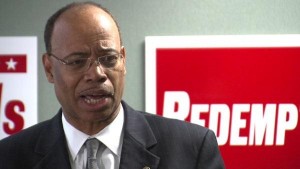 The Chicago Tribune wasn’t exaggerating in the slightest when it recently described the crowded Democratic primary to replace disgraced former Congressman Jesse Jackson, Jr., in Illinois’ scandal-plagued second congressional district as “a varied and fascinating” field.
The Chicago Tribune wasn’t exaggerating in the slightest when it recently described the crowded Democratic primary to replace disgraced former Congressman Jesse Jackson, Jr., in Illinois’ scandal-plagued second congressional district as “a varied and fascinating” field.
How else might one describe a sixteen-candidate field that includes former U.S. Rep. Mel Reynolds, a convicted felon who was sentenced to five years in state prison on several sex-related charges, including having sex with an underage volunteer campaign worker, and while serving that time was convicted on fifteen counts of bank fraud and other federal campaign-related improprieties?
It was Reynolds, after all, who former Rep. Jackson had replaced more than 17 years ago — ironically, also in a special election — after Reynolds himself had resigned in disgrace.
Controversy and scandal are nothing new in the 2nd congressional district. Like Reynolds, Gus Savage — the man he unseated in 1992 — and Jackson, his own successor three years later, the district’s last three congressmen each left office under a cloud of corruption.
While most readers of Uncovered Politics are familiar with former Rep. Jackson’s legal problems, some may not be aware of the temperamental and fiery Savage, a six-term congressman who compiled one of the worst records of absenteeism in the U.S. House and notoriously flaunted Federal Election Commission disclosure requirements. He was later accused of making improper sexual advances to a young female Peace Corps volunteer during a fact-finding trip to Zaire in 1989 and was handily defeated by Reynolds three years later.
The Mississippi-born Reynolds, in turn, resigned in October 1995 following his conviction on twelve counts of sexual misconduct and obstruction of justice — charges stemming from his 1992 campaign against Savage.
The scandals never seem to end in that largely underserved district. It’s a legacy that the Rev. Isaac Hayes, Jackson’s little-known Republican opponent in 2010, called “a 3-peat of political corruption.”
Savage, Reynolds, Jackson — and now, Reynolds again?
It’s not entirely impossible. Stranger things have happened.
At least one of his Democratic rivals was stunned to hear that hear that he was actually running. “I can’t believe he entered,” sighed former Congresswoman Debbie Halvorson of Crete, an early frontrunner in the race. “There is a point where we really need to put honor back into being a member of Congress.”
But even Halvorson sounded somewhat forgiving. “He paid his debt to society, and we have to remember that too,” she said. “There’s going to be a lot of people in this race and each one of us is going to be vetted. I believe that each one of us is going to have our chance.”
Most observers don’t think it’s possible, especially given the quixotic nature of his candidacy — Reynolds isn’t spending much money — but the former congressman insists that he’s a changed man and believes deep in his soul that enough of the district’s voters believe that he has paid the price for his sins and might be willing to give him a second chance.
Not surprisingly, he’s running under the slogan “Redemption.”
A former assistant political science professor at Chicago’s Roosevelt University and the first African-American Rhodes Scholar in Illinois history, Reynolds rebuilt his life after leaving prison and currently works as a self-employed financial consultant, acting as a broker between African investors and U.S. companies.
In an usually crowded field, the 61-year-old Reynolds doesn’t need an overwhelming number of forgiving souls to propel him to an upset victory. As strange as it seems, a candidate could conceivably capture the Democratic nomination with as little as 15 or 20 percent of the vote, particularly in a low-turnout contest where there are several “major” contenders and where candidates are fighting tooth-and-nail for the support of every likely voter, which probably won’t be many.
Reynolds, who was pardoned in 2001 as one of the 176 last-minute commutations and pardons famously issued by President Clinton as the left office, received six percent in a seemingly audacious bid for his former House seat in 2004 — barely three years after being released from prison. It was obviously too soon to ask for forgiveness.
That was nearly a decade ago.
As of last month, the former congressman was polling at 5 percent in this race. At 77 percent, he also enjoyed the highest name recognition of any candidate running in the special election — but in his case that’s probably not a particularly good thing.
Nevertheless, Reynolds is hoping his persistence will pay off and that there’ll be a few more people this time around who will relate to his story of trying for a second chance in life. “Nobody’s perfect,” he says solemnly, adding that everybody makes mistakes.
“I’m not perfect and if you’re perfect, I’m not appealing to you,” he said in declaring his candidacy in late November, shortly after the embattled Jackson announced his resignation from Congress. “I’m appealing to people who want to take a fair look at all of my history, all of my work, all of my education, what I’ve done since those times, what I’ve done before those times.
“That’s all I’m asking.”



Saying that Reynolds “paid his price to society” implies that there’s a price you can pay to rape a child. Unless you’re in the business of prostituting children, that’s not a society you’d want to belong to.